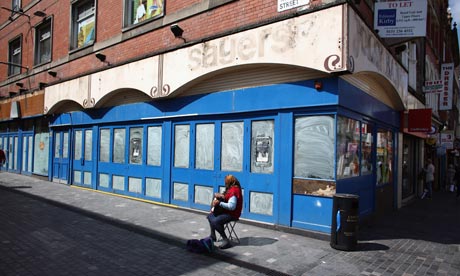High-street shop closures are expected to continue in the run-up to Christmas after a dive in consumer spending left retail sales down in August on the same month last year.
New data from the British Retail Consortium (BRC) on Tuesday shows a decline of 0.6% in retail sales last month, which could prove disastrous for many shops after a slow spring and summer. The BRC blamed a decline in consumer confidence, high inflation and a squeeze on personal finances.
The new decline in high-street spending will fuel fears of a double-dip recession, which were heightened on Monday after a survey of the vital services sector – which makes up about 70% of the economy – showed it suffered the sharpest slowdown last month since the foot-and-mouth crisis of 2001.
David Noble, chief executive of the Chartered Institute of Purchasing and Supply (CIPS), described the drop in the services purchasing managers' index as "eye-watering". It sent the pound falling to a six-week low of $1.6103 against the dollar. Labour said the chancellor, George Osborne, needed to heed warnings from economists and City institutions that policymakers needed to act to reverse a slowdown in growth.
Angela Eagle, shadow Treasury spokeswoman, said: "Our complacent chancellor needs to realise that carrying on regardless with a plan that isn't working is not a credible policy. We need leadership on the world stage to agree a global plan for growth and a more balanced deficit plan that puts jobs and growth first."
Several high-profile economists have already warned that the government it needs to change course to avoid another recession. David Blanchflower, a US academic and former monetary policy committee (MPC) member, said a review of spending cuts was urgently needed to avoid a collapse in business and consumer confidence. Capital Economics said the chances of an outright double-dip in overall GDP were rising.
Martin Weale, who voted to raise interest rates earlier this year as a member of the MPC, recently indicated that a worsening of the economic outlook had caused him to review his stance and hinted he would support a third round of quantitative easing (QE) by the Bank of England.
At its meeting later this week the Bank is expected to discuss proposals to boost the £250bn of bonds it has bought as part of the QE programme.
Markit, which compiled the grim services data, said that the general economic uncertainty was hurting the UK services sector, leaving many companies struggling to generate new business. Some firms also reported that the riots that struck parts of the UK last month had also hit trading.
"Allied with soft manufacturing data and a slowdown in construction growth, the overall picture provided by the latest PMI surveys is one of a stuttering UK private sector," said Markit's senior economist, Paul Smith.
"Job losses were again reported as firms remain reluctant to replace leavers or are forced to cut positions in response to excess capacity," Smith said.
Markit/CIPS also found that business confidence in the UK services sector was the lowest for a year. The survey found that worries over the impact of government spending cuts were also "depressing sentiment".
Howard Archer, chief UK economist at IHS Global Insight, said the services data "really rings the growth alarm bells".
He said: "The very sharp slowdown in activity in the services sector in August indicated by the purchasing managers' survey is a particularly significant blow to the economy given the sector's dominant role. Even allowing for any impact from the riots and a correction after a surprise spike up in services activity in July, this is a hugely disappointing survey. The only crumb of comfort is that it shows services activity is still expanding."
He said the fall in the Markit index to 51.1 in August, down from 55.4 in July, and far below analysts' expectations of 54.3, could be the start of a longer-term decline after firms reported that incoming new business moderated, backlogs of work contracted, employment fell and business expectations sank to a 13-month low.
The BRC's snapshot of the high street found that food was the only area to hold up, while spending on shoes, women's clothing and furniture dropped sharply. The depressed state of the housing market also held back sales of household goods. In the three months from June sales of non-food items declined by 1.5% on a year earlier. If the impact of inflation is excluded from the figures, they would be substantially worse.
Stephen Robertson, BRC director general, said the picture last year was rosier, with sales improving and confidence growing. But 2011 has proved more difficult and any growth in spending is largely due to the VAT rise to 20% in January.
He said: "The retail sector's performance for August has been essentially flat, particularly bearing in mind the increase in VAT, which will be responsible for some of the growth in spending. It remains a tale of two halves. The food sector has proved more resilient but non-food retail showed a marked decrease in sales year-on-year.
"Poor consumer confidence, high inflation and the ongoing squeeze on personal finances remain the biggest threats to the retail sector. Sales of big-ticket items are very dependent on discounting and many retailers' margins are being cut to the bone."
